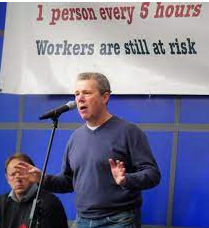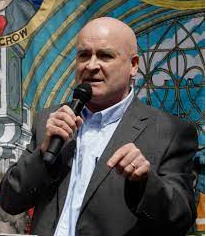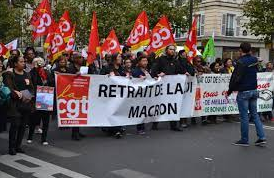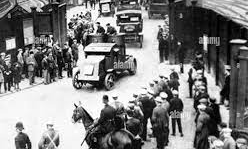27 October 2022
General Strikes
Coming our way
by Don Urquhart

The General Strike in 1926 was broken by the combined efforts of “special constables” and the army. In 2023 we might see a repeat. There is no enthusiasm among workers for austerity or “difficult decisions” as it is often described. The markets seem to be demanding a period of reduced public services. Will the population stand for it? Or for the alternative – higher taxes? The really tough decision for Hunt and Sunak is “What can we get away with?” Hunt in his initial backtracking retained the removal of the cap on banker’s bonuses, justifying it with the classic trickledowners’ argument that it would generate more tax. That one will not wash with the #enoughisenough adherents.
Rowena Mason and Heather Stewart in The Guardian have provided a thorough analysis of industrial unrest in the UK.
Trade union leaders are warning of a wave of synchronised strikes by civil servants and public sector workers in Britain this winter, as a new poll for the TUC showed one in seven people across the UK are skipping meals because of the cost of living crisis.

As trade unionists met for the annual TUC congress in Brighton, Mark Serwotka, the head of the PCS union, representing 150,000 civil servants, said it stood ready to strike on the same day as others if its workplaces voted for industrial action in November.
“If we win those ballots, we stand prepared to take action on the same day as any other union to show the government we strike together,” he said.
He suggested road officials could take action on the same day as rail workers and Border Force officials on the same day as airport staff, to cause maximum disruption.
Serwotka was among a string of trade union chiefs who intensified their warnings of coordinated strikes across multiple sectors this winter to cause more disruption, increase effectiveness and try to win pay disputes.
With unions pushing for higher pay to match inflation at 10%, the TUC released polling showing one in seven people are skipping meals and going without food.
It also found more than half of Britons cutting back on heating, hot water and electricity.

Mick Lynch, the general secretary of the RMT, which is balloting to extend the mandate for rail strikes, told a fringe meeting: “We need an uprising. We need a whole wave of synchronised, coordinated action. I don’t care what it’s called.
Frances O’Grady, giving her last keynote address to the congress, said coordinated action was “already happening”. She said: “When workers are left with no choice but to vote for strike action for decent pay, I say: bring it on.”
She later told the Guardian: “We’ve had a number of meetings already. Obviously in [some] sectors it can make particular sense to synchronise days and timing.
Unions have announced a huge number of strike ballots this autumn, with nurses, health workers, ambulance workers, and civil servants all among those currently considering whether to vote for strikes over the winter.
The school leaders’ union, the NAHT, told congress that headteachers would be balloted on industrial action in a row over pay and funding, in a 125-year first.
Christina McAnea, the general secretary of Unison, which is balloting 400,000 health workers, said: “Coordinated action unites us and we have a single goal: end this pay crisis in this country.”
Andy Kerr, the deputy general secretary of the CWU, the postal workers’ union, said he supported “coordinated industrial action to defend ourselves”, and Steve Gillan, of the Prison Officers’ Association, said his members would strike if they were allowed to. The CWU has 160,000 people on strike this Thursday.
Serwotka was one of the most stridently in favour of coordination, telling a PCS fringe meeting that the stakes were incredibly high.
“If we do not win, people will die of malnutrition, they will die of hypothermia. They will die on our streets,” he said.
Paul Whiteman, the general secretary of the NAHT, said members had told him they “cannot continue to run their schools in the current circumstances”, and neglect of pay and funding was eroding education.
I was surprised to hear from an old business colleague who lives in France that petrol is hard to find there. Our insular media has given it little coverage but as far as industrial unrest is concerned our neighbour is ahead of us according to Al Jazeera :
Trade unions begin multi-sector industrial action over salaries amid high inflation, adding to the weeks-long strike in oil refineries.

Protesters have clashed with police and broke shop windows as French trade unions began a nationwide strike to demand higher salaries amid the highest inflation in decades, one of the biggest challenges to President Emmanuel Macron since his re-election in May.
Eleven people were arrested in Paris, the interior ministry said in the early evening on Tuesday, adding that 107,000 people nationwide followed the protest call from left-wing parties and some unions, including 13,000 in the capital. The CGT trade union said 70,000 people took part in the march in Paris.
Tuesday’s strike, which primarily affects public sectors such as schools and transportation, is an extension of the weeks-long industrial action that has disrupted France’s major refineries and put petrol stations’ supply in disarray.
Regional train traffic was cut by about half, seeking to capitalise on anger at decades-high inflation to expand weeks of industrial action at oil refineries to other economic sectors.
Beyond transport workers, unions hope to bring out staff in sectors such as the food industry and healthcare.
Trade union leaders are hoping workers will be energised by the government’s decision to force some of them to go back to work at petrol depots to try and get the fuel flowing again, a move some have said may jeopardise the right to strike.
As tensions rise in the euro zone’s second-biggest economy, strikes have already spilled over into other parts of the energy sector, including nuclear giant EDF, where maintenance work crucial for Europe’s power supply will be delayed.
The strikes are happening in a tense political climate as the government is set to pass the 2023 budget using special constitutional powers that would allow it to bypass a vote in parliament, Prime Minister Elisabeth Borne said on Sunday.
Thousands of people took to the streets of Paris on Sunday to protest against soaring prices.
The leader of the hard-left party La France Insoumise (France Unbowed), Jean-Luc Melenchon, marched alongside this year’s Nobel Prize for literature winner, Annie Ernaux.
Melenchon called a general strike for Tuesday.
Kwarteng identified strikers as his main enemy and one wonders whether Jeremy Hunt and Sunak will take a similar view.
It remains to be seen whether their compassionate conservatism will stop them sending in police and troops as enforcers.


